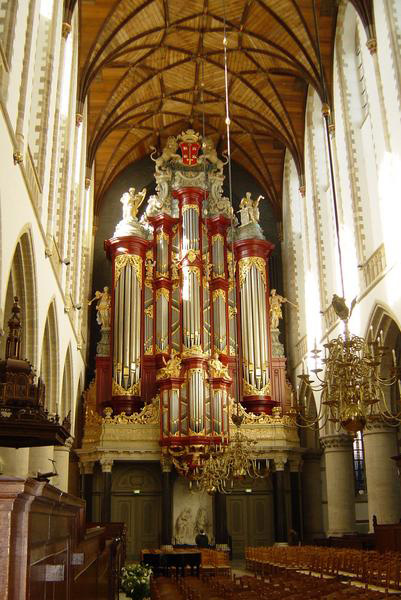


Haarlem, Grote Kerk St. Bavo
Christian Müller 1735-38, case by Jan van Logteren
State of preservation: After a series of modernisations during the 19th and 20th centuries a thorough restoration in 1959-61 by Marcussen & Sohn followed including the reconstruction of several stops; minor later repairs concerning the intonation of those occured from 1987 until 2000 by Flentrop Orgelbouw.
In the 18th century this organ was considered the biggest world wide, and its 32' pipes in the front and the imposing number of 60 stops (all metal) on three manuals do not fail to impress even today. Many musicians of the 18th century traveled to Haarlem to see, hear and play it, among them Händel and the ten year old Mozart during his first European tour in 1766. So did Charles Burney, also mentioning the costs one had to pay to get permission.
Music sample
Johann Sebastian Bach (1685-1750) : Concert a (after Vivaldi opus 3/6), BWV 593
played by Jaques van Ortmerssen
Specification:
III+P/60; manuals C-d3
pedal C-d1
Hoofdwerk (HW)
Praestant 16’ (2f. from c1)
Bourdon 16’
Octaaf 8’ (2f. from g0)
Viool de Gambe 8’ (1961)
Roerfluit 8’
Roerquint 6’
Octaaf 4’
Gemshoorn 4’
Quintprestant 3’
Woudfluit 2’
Tertiaan 2f.
Mixtur 9-10f.
Scherf 6-7f. (1961)
Trompet 16’
Trompet 8’
Hautbois 8’
Trompet 4’
Rugpositief (RP)
Prestant 8’ (2f. from g0)
Holpijp 8’
Quintadena 8’ (1961)
Octaaf 4’
Fluit douce 4’
Cornet [4’] 4f. (from c1)
Speelfluit 3’
Superoctaaf 2’
Sexquialter 2-4f.
Mixtuur 6-8f.
Cymbaal 3f.
Fagot 16’
Trompet 8’
Trechterregaal 8’ (1961)
Bovenwerk (OW)
Quintadena 16’
Prestant 8’ (2f. from g0)
Quintadena 8’
Baarpijp 8’ (conical)
Octaaf 4’
Nasard 3’
Flagfluit 2’
Nachthoorn 2’
Flageolet 1 1/2’
Sexquialter 2f.
Mixtuur 4-6f. (1961)
Cymbaal 3f. (1961)
Schalmei 8’
Dolceaan 8’
Vox humana 8’
Pedaal
Principaal 32’
Prestant 16’
Subbas 16’ (1961)
Roerquint 12’
Octaaf 8’
Holfluit 8’
Quintprestant 6’
Octaaf 4’
Holfluit 4’
Ruischpijp 3f. (1961)
Mixtuur 6-10f. (1961)
Bazuin 32’
Bazuin 16’
Trompet 8’
Trompet 4’
Cink 2’
5 Koppeln (neu ergänzt 1961) Tremulanten zum OW und RP
© Greifenberger Institut für Musikinstrumentenkunde | info@greifenberger-institut.de




